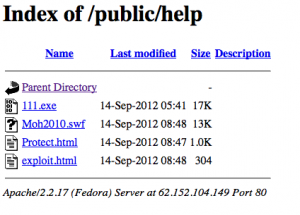Update: Microsoft Offers Guidance for Internet Explorer Zero-Day
Update: Chinese Gang Targeting Defense Firms With IE Zero-Day
A new zero-day vulnerability affecting Internet Explorer is being exploited in the wild, according to security researcher Eric Romang.
“I can confirm, the zero-day season is really not over yet. Less than three weeks after the discovery of the Java SE 7 0day, aka CVE-2012-4681, potentially used by the Nitro gang in targeted attacks, a potential Microsoft Internet Explorer 7 and 8 zero-day is actually exploited in the wild,” Romang wrote in a blog post.

Romang had been monitoring some infected servers said to be used by the alleged Nitro gang. On September 14th, Romang said he discovered a directory (public/help) on one of the servers that housed a number of files.
Curious to see what was in store, he downloaded the files to his system to take a deeper look.
Two files in question appear to be responsible for the execution of the attack.

First, a file named “exploit.html” appears to be the entry point of the attack, which loads “Moh2010.swf”, an encrypted Flash file that it decompress in memory.
According to AlienVault’s Jaime Blasco, the payload dropped is Poison Ivy, as was the case with the previous Java zero-day. Poison Ivy is a remote administration tool (RAT) that was used the Nitro attacks that targeted chemical and defense companies.
Interestingly, after exploitation, the attack loads “Protect.html”, a file that checks to see if the Web site is listed in the Flash Storage settings, and if it is, the Web browser will no longer be exploited despite additional visits to the malicious site.
“The exploit seems to be originating from the same group who has recently created and/or used the infamous Java zero-day,” Chaouki Bekrar, CEO and Head of Research at VUPEN told SecurityWeek.
As mentioned, Romang’s first found the new zero-day code on the same server that was initially used to spread the recent Java zero-day, making people think they if both codes were not created by the same group, they are at least related.
According to VUPEN’s initial analysis, the exploit takes advantage of a “use-after-free vulnerability” that affects the mshtml.dll component of Internet Explorer. The vulnerability, if exploited, would allow full remote code execution and enable an attacker to take over an affected system.
The underlying flaw affects IE 9 and earlier, and from what has been seen so far, the in-the-wild exploit only targets IE 8 and 7 on Windows XP only, Bekrar said.
“The vulnerability was probably found by fuzz testing and its exploitation was trivial on Windows XP,” Bekrar added.
Rapid7 on Monday released an exploit module for Metaspolit which will let security teams and attackers alike test their systems.
“Since Microsoft has not released a patch for this vulnerability yet, Internet users are strongly advised to switch to other browsers, such as Chrome or Firefox, until a security update becomes available,” Rapid7 noted.
Update: Microsoft Offers Guidance for Internet Explorer Zero-Day
Update: Chinese Gang Targeting Defense Firms With IE Zero-Day
Update: Coordinated Cyber Attacks Hit Chemical and Defense Firms














